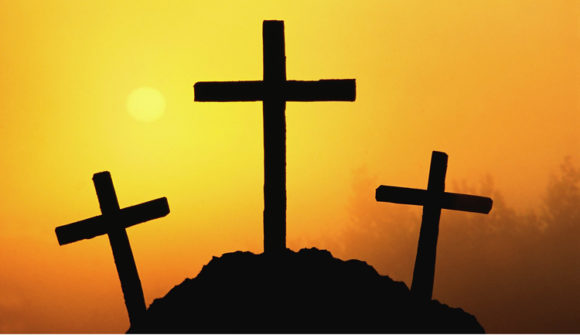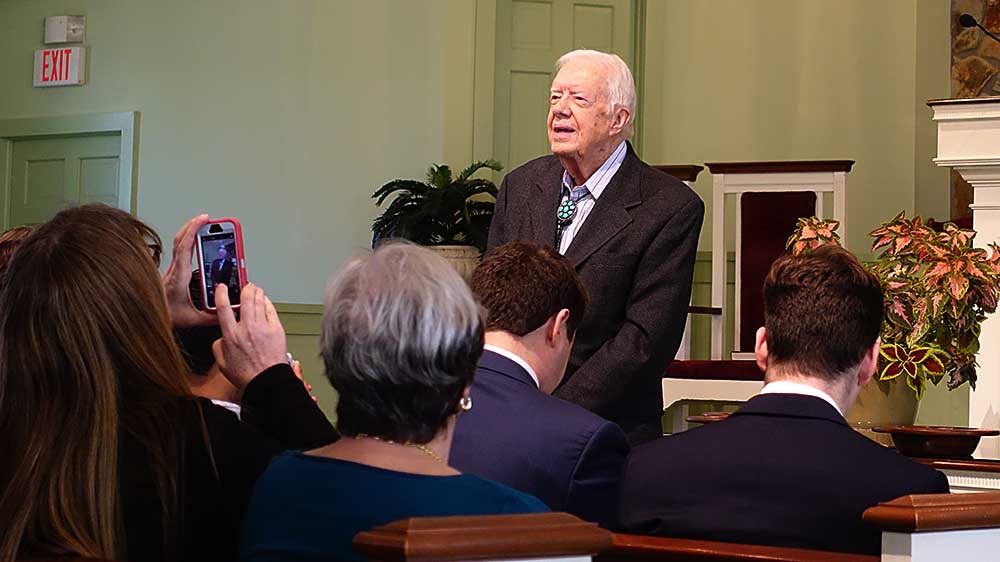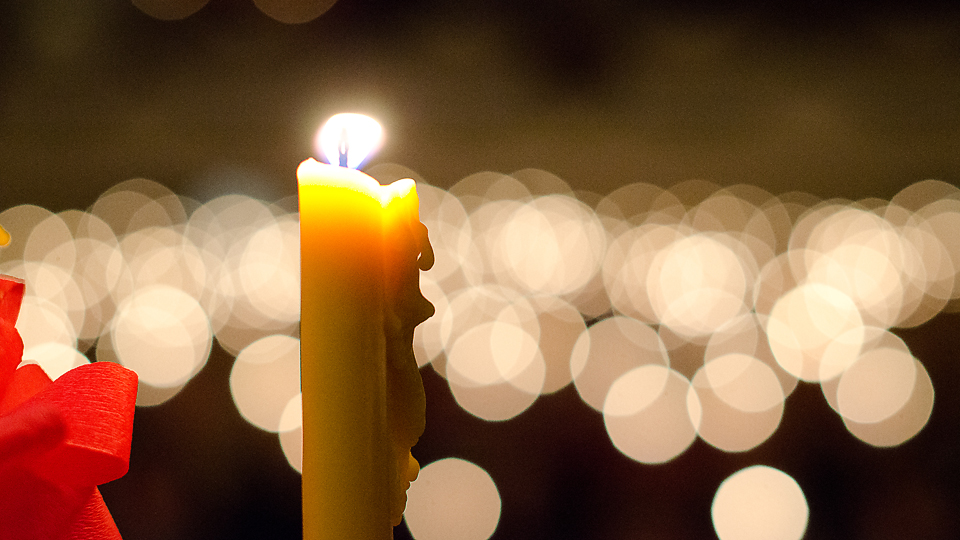Worth Green, Th. M., D. Min.
In the 3rd Christian century, St. Augustine said that the Sermon on the Mount was “the perfect standard of the Christian life.” In the 15th century the Ancient Moravian Unity called themselves “Brethren of the Law of Christ.” They tried to live according to the Sermon on the Mount, which they interpreted in light of John 13:34 wherein Jesus says, “Love one another, as I have loved you.” The hymn we sang this morning captures this theology perfectly:
One our Master, one alone, None but Christ as Lord we own;
Brethren of his Law are we, “As I loved you, so love ye.”
Branches we in Christ, the Vine, living by his life divine,
As the Father with the Son, So, in Christ we all are one.
Non-Christians have admired the Sermon on the Mount, too.
Jesus was a Jew, and many Jews appreciate his teaching. The great 20th century Jewish scholar, Claude Montefiore wrote a commentary on the synoptic gospels from a Jewish perspective. He made it clear that he did not worship Jesus; yet, he called Jesus one of the greatest teachers of Israel, and he regarded the Sermon on the Mount as the absolute core of Jesus teaching.
Mahatma Gandhi was not a part of the Judeo-Christian tradition. He was a Hindu. He did not worship Jesus, but he loved and admired Jesus the teacher, and he took the teaching of Jesus literally. In Matthew 5:39 Jesus said, “Do not resist an evildoer. But if anyone strikes you on the right cheek, turn the other also.” Gandhi took this word of Jesus, adopted it as his own, gave it to India’s independence movement, and said, “We will match our capacity to endure suffering against the capacity of the British to inflict suffering, and we will win.” They did, too, and on midnight of August 15th, 1947, the British gave India home rule.
Some have said, “Well, it is a good thing for Gandhi he was up against the British, and not up against the Nazi’s. That is true, and it gives rise to an important consideration. Without doubt, the Sermon on the Mount is one of the most important sermons Jesus every preached, but many disagree as to how it should be interpreted. Martin Luther, the Father of the Protestant Reformation thought that all Christians ought to seek to live according to the Sermon on the Mount, yet, he continued to be suspicious of those Christians who thought they were living by it fully. Luther believed that a primary function of the Sermon on the Mount is to drive us to grace. It is way up her, as far up as we can reach; and we are way down here, as if we were bending to touch our toes. Thus the Sermon on the Mount drives us to our knees, where we can receive God’s mercy and grace.
This morning we take up that section of the Sermon of the Mount known as the Beatitudes. There are nine Beatitudes; and, when we read them, it is easy to see that each of them is worthy of a sermon. As a matter of fact, some scholars, believe that each of the nine Beatitudes were originally used by Jesus to summarize a much longer block of teaching. In other words, Jesus may have taught for twenty minutes, or an hour, on what it means to be “poor in spirit,” and then summarized that lengthy instruction by saying, “Blessed are the poor in Spirit, for theirs is the kingdom of God.” Or, Jesus may have taught for thirty minutes on what it means to be meek, and then summed up that instruction by saying, “Blessed are the meek for they shall inherit the earth.” One of my teachers at Princeton Theological Seminary, the late Dr. Bruce Metzger, believed this to be the case.
Of course, Jesus may have said all nine Beatitudes one right after the other, just as they are written down. The late Bishop Herbert Spaugh saw the Beatitudes as a premier example of what he called “cafeteria preaching.” He said that every congregation would always consist of a range of people with a variety of needs. Therefore, a preacher must put out a variety of edifying ideas, and then allow people to pick and choose what they need, just as they do when the pass down the line at the K & W Cafeteria. Bishop Spaugh said Jesus was a cafeteria preacher, and I should become a cafeteria preacher, too.
Along these same lines, not long ago, I heard Frank Crouch, the dean of Moravian theological seminary talk about how we interact with the Bible. He said, “When we read a selection from the Bible, and the fix upon a portion of the text, it is not so much that we choose the text, as the text chooses us.” That is right-on! The texts of the nine Beatitudes have been choosing people for almost 2,000 years. My father used to say that one of the Beatitudes was instrumental in the conversion of his maternal grandfather, John Easter. He said that Grandaddy Easter was was a farmer. He was not ignorant of the Bible, nor his need for grace; but, as he approached middle age, he knew that he had never really settled his life before God. One night Grandaddy Easter came in from a long day in the field, ate supper, then went into the parlor. He sat down on the sofa, took-up the big, old family Bible, and opened it to the fifth chapter of Matthew. Grandmother Easter sat by his side and he began to read:
“Blessed are the poor in Spirit, for theirs is the kingdom of God,” he read. “That is not me,” he said. “Blessed are those who mourn, for they will be comforted,” he read. “That is not me,” he said. “‘Blessed are the meek, for they will inherit the earth,” he read. ““That is not you!,” she said. “No, that is not me,” he said. Then my great-granddaddy read the fourth Beatitude, “Blessed are those who hunger and thirst for righteousness, for they will be filled.” “That is me!,” he said.
I agree with my father. Righteousness mean having a right relationship. Great Grandaddy Easter was hungering and thirsting for a right relationship with God. He did not have it, and he wanted it, so he claimed it, even as fourth Beatitude claimed him. Grandaddy Easter is a perfect example of something that St. Augustine said. Augustine said that each of us has a God-shaped space in our soul, and we are never truly satisfied until we fill it. I don’t know if Grandaddy Easter had ever heard that saying. I don’t know if Grandaddy Easter had ever heard of Augustine. I do know that he spent the rest of his life trying to fill his life with God. My father used to say that Grandaddy Easter lived to be almost 100 years old, and at the tag end of his life, he was so much aglow with God’s love, that he would drive out to his farm, just to bask in his presence, even as the Israelites once basked in the presence of Moses, whose face was aglow from his visit with God.
Now let me ask you a question: Which of the Beatitudes has chosen you?
Perhaps you know yourself to be “poor in Spirit.” In the Beatitudes, only two kinds of people possess the kingdom of God right now, the poor in spirit and the persecuted. The persecuted know that when life really let’s us down, only God can pick us up. The poor in Spirit know this even without persecution.
Or, perhaps you are mourning because you have lost someone, or something that you love, and you want God to comfort you. People mourn the passing of people, but individuals also grieve the loss of of a job, and married couples grieve when their children leave the house, and their nest is empty. You can grieve the loss of almost anything, from a valued possession, to a friendship, to your youth and physical health. My mother is in assisted living. Her thinking is not always clear, but when it is, she often grieves the loss of her independence. Not long ago she looked at me across the top of her walker and said, “I feel like I am in jail.” I told her I was doing the best I could for her, and reminded her than what Jesus once said to Peter was applicable to all of us as we grow older. Jesus said, “Peter, when you were young, you dressed yourself, and went wherever you wanted to go; when you are old, others will dress you and take you where you do not want to go.” Jesus says that those who mourn will be comforted. Over and over again, I find I am comforted when scripture gives me some special insight into my life.
My friend Ron S______ was attracted by to the third beatitude, “Blessed are the meek, for they will inherit the earth.” Ron said that the meek were not like Casper Milquetoast who lacked the confidence to stand up for himself. He said that the meek have an uncanny ability to reflect reality, and use just enough force to get the job done. A meek person would never use a tack hammer when a sledge hammer was needed, and they would never use a sledge hammer when a tack hammer was enough.
Perhaps you are attracted to the fifty Beatitude, “Blessed are the merciful, for they will receive mercy.” The New Testament insist that if we are to be forgiven, we must be forgiving. A little later in the Sermon on the Mount, in Matthew 6, Jesus teaches his disciples to pray saying, “Forgive us our trespasses as we forgive those who trespass against us.” Some of us do not take those words as seriously as we ought. Robert Louis Stevenson certainly did. When living in Samoa, it was his habit to share devotions with his wife every morning after breakfast. One morning, there were praying the Lord’s Prayer when he suddenly halted his prayer, put on his hat, and left the house. When he returned, his wife said, “What happened? Why did you leave so abruptly? Where did you go?” He said, “I went to see a man in town who did me an unkindness.I held a grudge against him, and I could not afford to ask God to forgive me of my trespasses, as I forgive the trespasses of others until I had forgiven him.” In James 2:13 we read, “For judgment will be without mercy to anyone who has shown no mercy.”
Or perhaps you are attracted to the sixth beatitude, “Blessed are the pure in heart, for they will see God.” Soren Kierkegaard said, “Purity of heart is to will one thing.” The secret of success in life is to will one thing. Too many of us major in minors. We allow our energies to fall like a gentle rain upon the earth. The man or woman who wants to make a real impact must concentrate all of their force in one direction, like one of those great hydraulic hoses that can knock down a mountain. Jesus says that if we want to see the God, we must “will one thing.” After St. Paul came face to face to the risen Christ, he did just that. He wrote, “This one thing I do, forgetting what lies behind, and straining forward to what lies ahead, I press on toward the goal for the prize of upward call of God in Christ Jesus.”
I have always found the seventh Beatitude attractive, “Blessed are the peacemakers, for they will be called children of God.” Jesus does not say that the peace loving will be called the children of God. And Jesus does not say that the peaceful will be called children of God. Jesus said that the peacemakers will be called the children of God. To be a peacemaker requires effort and risk, and the effort we make, and the risk we take, will be dictated by the situation in which we find ourselves. It was Pope Paul Vi who said, “If you want peace, work for justice.”
Few people are want to be chosen by the final two Beatitudes. The eighth Beatitude declares, “Blessed are those who are persecuted for righteousness’ sake, for theirs is the kingdom of heaven.” This Beatitude can be heard impersonally, but the ninth cannot. The ninth Beatitude is the only Beatitude that Jesus addressed to his disciples in the 2nd person:
“Blessed are you when people revile you and persecute you and utter all kinds of evil against you falsely on my account. 12 Rejoice and be glad, for your reward is great in heaven, for in the same way they persecuted the prophets who were before you.
I think it is interesting that Jesus tells his disciples that our suffering will be like the suffering of the prophets. A prophet, like a philosopher, lives in advance of his age. A prophet does not look at the world and say, “This world as it is is good enough for God and humankind.” The prophet looks at the world points out its problems. Thus Isaiah the prophet considered his world and said, “Woe is me for I am a man of unclean lips, and I live in the midst of a people with unclean lips.” The prophet both fore-tells and forth-tells God’s new day. In the same way, Christians live in advance of our age, for we live from the future that is coming to us in Jesus Christ. The world is blind to this future, and that is the reason that prophets, and Christians, are often persecuted. I have never wanted to be a prophet. I doubt you have; but sometimes, that is what God calls us to be, for, according to the New Testament, all God’s people are prophets, for all of us possess the Spirit. (Romans 8:9)
Finis












